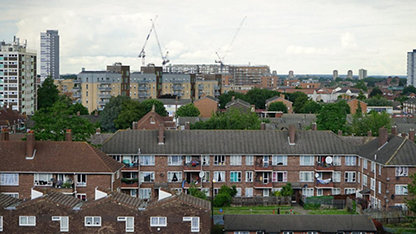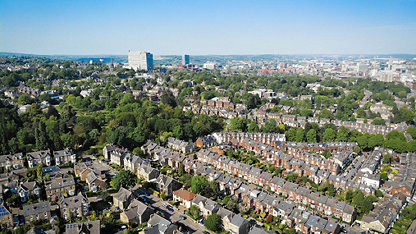Sustainability is a top concern in building surveying today, which shapes industry standards, practices, and innovation. As environmental challenges are consequential in the built environment, sustainability is not only considered a moral obligation but a strategic imperative for projects worldwide. Ahead of the RICS Building Surveying Conference, we explore the latest developments, best practices, and emerging trends in sustainability regulation, delving into how innovation and collaboration are driving progress within building surveying.
Latest Developments in Sustainability Regulation
Energy efficiency standards such as Minimum Energy Efficiency Standards (MEES) and Environmental, Social, and Governance (ESG) criteria are becoming stricter. Certifications like Leadership in Energy and Environmental Design (LEED) for commercial properties are gaining prominence, signalling a shift towards eco-conscious building practices.
Circular economy principles, promoting sustainable materials and resource repurposing, are also gaining traction. Adopting industry specific tools, such as Building Information Modelling (BIM), has revolutionised sustainable design and construction, enabling efficient resource management and precise environmental assessments.
Collaboration is the Catalysts for Sustainability Progress
Collaboration between building surveyors and professionals from diverse fields has never been more crucial for driving progress. Integrating knowledge from multiple disciplines and geographies has allowed innovative solutions to be developed that address sustainability challenges. This collaborative approach drives innovation and ensures that sustainability considerations are embedded throughout the project lifecycle.
The RICS Building Surveying Conference serves as a pivotal platform for driving collaboration within the industry, enabling professionals to come together and address complex sustainability challenges. Speaker at the conference, Tarniah Thompson CIWFM MCIM PIEMA, Head of Facilities Management & Sustainability, states, "I will share how to navigate challenges, engage stakeholders effectively, and foster a sustainable culture. From data-driven decision-making to collaborative approaches for cost control and environmental goals. I aspire to empower the audience with actionable knowledge to turn green ambitions into tangible reality within the FM/property landscape." Thompson's insights highlight the importance of collaborative approaches for achieving sustainability goals and driving positive change within the industry. By facilitating dialogue and knowledge-sharing among industry experts, the conference plays a crucial role in driving collective action towards building a more sustainable future.
Gemma Cornwall MRICS, Director and another key speaker at the upcoming RICS Building Surveying Conference, shares, "My mission is to demystify sustainability and empower clients to make informed plans and decisions so that sustainable choices become the norm." She emphasises the importance of providing advice and guiding clients towards sustainable options.
Strategies for Meaningful Progress in Sustainability
To make sustainable progress, the building sector can employ several key strategies. Smart technologies play a pivotal role in enabling accurate and efficient assessments of building sustainability, facilitating better-informed decision-making.
Transitioning to a circular economy model is another essential strategy, maximising resource efficiency by adopting sustainable materials and designing resilient buildings. Sustainability should be incorporated at the core of projects at every stage, integrating sustainable design principles and green guidelines from inception to completion.
Furthermore, the proactive involvement of building professionals is crucial. Staying updated on evolving standards, trends and common challenges promotes a holistic approach to sustainability solutions.
Building a Resilient and Sustainable Sector
The industry has made significant strides in building sustainable and resilient infrastructure, driven by a collective commitment to environmental stewardship and innovation. However, there is still plenty of work to be done to address the complex challenges posed by climate change and urbanisation across the globe.
By participating in professional networks and knowledge-sharing platforms, surveyors can expand their skill set, exchange ideas, and drive continuous improvement in sustainable building practices.
As Dale Holmes MRICS, Director at Maison Surveyors, states, "I'm always eager to stay ahead of the curve in the building surveying industry. That's why I'm excited about attending the Building Surveying Conference. The valuable insights and connections I gained were instrumental in my work."
Navigating the landscape of evolving standards while excelling in sustainability requires a concerted effort from all professionals in the building sector. Embracing innovation, collaboration, and proactive strategies, the building surveying industry can pave the way for a more sustainable and resilient future.
Join us at the RICS Building Surveying Conference on Tue 07 May 2024 at etc.venues 133 Houndsditch, Liverpool Street, London, EC3A 7BX to delve deeper into sustainability in building surveying. Gain actionable insights, network with industry leaders, and be a part of driving meaningful change. Register now to secure your spot and be at the forefront of building a sustainable future!













